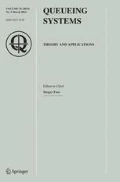Abstract
This paper presents some analytical results concerning an approximation procedure for closed queueing networks. The procedure is well-known and has been found useful for product-form networks where large numbers of queues, jobs or job classes prohibit an exact analysis, as well as for networks which do not possess product-form. The procedure represents the mean sojourn time at a queue as a function of the throughput of the queue, and derives a set of fixed point equations for the throughputs of the various job classes. We begin by showing that under a mild regularity condition the fixed point equations have a unique solution. Then we show that derivatives of performance measures can be readily calculated, and that their simple form provides an interesting insight into capacity allocation in closed queueing networks.
References
O.J. Boxma, J.W. Cohen and H.C. Tijms, eds.,Teletraffic Analysis and Computer Performance Evaluation Elsevier, Amsterdam, 1986.
D.P. Bertsekas, E.M. Gafni and R.G. Gallager, Second derivative algorithms for minimum delay distribution routing in networks, IEEE Transactions on Communications 32 (1984) 911–919.
W.-M. Chow, Approximations for large scale closed queueing networks, Performance Evaluation 3 (1983) 1–12.
E. De Souza E. Silva, S.S. Lavenberg and R.R. Muntz, A perspective on iterative methods for the approximate analysis of closed queueing networks, In[7], (1984) 225–244.
R.G. Gallager, A minimum delay routing algorithm using distributed computation, IEEE Transactions on Communication 25 (1977) 73–85.
E. Gelenbe and G. Pujolle,Introduction to Queueing Networks (Wiley, Chichester, 1987).
G. Iazeolla, P.J. Courtois and A. Hordijk eds.,Mathematical Computer Performance and Reliability (Elsevier, Amsterdam, 1984).
F.P. Kelly,Reversibility and Stochastic Networks (Wiley, Chichester, 1979).
F.P. Kelly, Blocking and routing in circuit-switched networks, In [1] (1986) 37–45.
F.P. Kelly, The optimization of queueing and loss networks, In:Queueing Theory and its Applications, eds. O.J. Boxma and R. Syski (North-Holland, Amsterdam, 1988) 375–392.
F.P. Kelly, Routing and capacity allocation in networks with trunk reservation. Mathematics of Operations Research.
D.G. Luenberger, Linear and Nonlinear Programming, 2nd ed. (Addison-Wesley, Massachusetts, 1984).
I. Mitrani, Fixed-point approximations for distributed systems, In [7] (1984) 245–257.
W. Whitt, The queueing network analyzer, Bell System Technical Journal 62 (1983) 2779–2815.
W. Whitt, Open and closed models for networks of queues, AT & T Bell Laboratories Technical Journal 63 (1984) 1911–1979.
Author information
Authors and Affiliations
Additional information
This work was supported in part by the Nuffield Foundation
Rights and permissions
About this article
Cite this article
Kelly, F.P. On a class of approximations for closed queueing networks. Queueing Syst 4, 69–76 (1989). https://doi.org/10.1007/BF01150857
Received:
Revised:
Issue Date:
DOI: https://doi.org/10.1007/BF01150857

